May 26, 2025 | 20:23 GMT +7
May 26, 2025 | 20:23 GMT +7
Hotline: 0913.378.918
May 26, 2025 | 20:23 GMT +7
Hotline: 0913.378.918
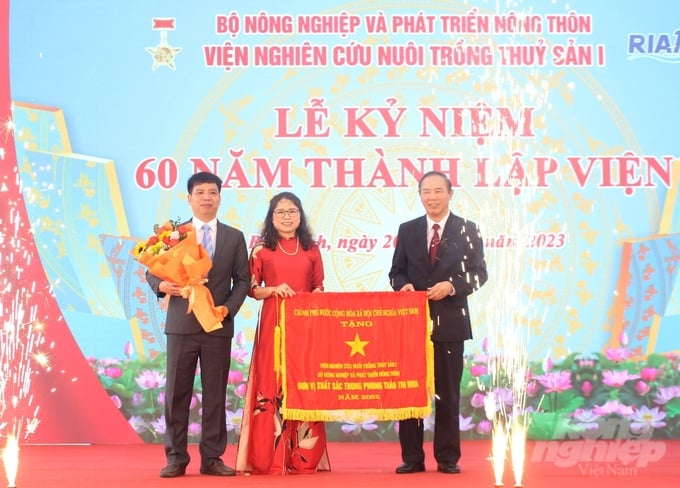
Deputy Minister of Agriculture and Rural Development Phung Duc Tien (right) awarded the Government's Emulation Flag to RIA I. Photo: Trung Quan.
Associate Professor Dang Thu Lua, Dean of the Research Institute for Aquaculture No.1 (RIA 1) shared that, over the course of 60 years of development (1963-2023), the institute has undergone three name changes, each corresponding to different periods with distinct functions and organizational structures including Freshwater Fish Research Station under the Ministry of Agriculture (1963-1977); Inland Aquaculture Research Center under the Ministry of Agriculture, later transferred to the Ministry of Fisheries (1977-1983); Research Institute for Aquaculture No.1 under the Ministry of Fisheries, which is now part of the Ministry of Agriculture and Rural Development (1983-present).
In the first stage, the institute paid attention to freshwater aquaculture research and expanded the research to salt and brackish water aquaculture objects in the 1990s. From the 2000s to now, the science and technology research activities of the institute have expanded to all fields from fresh water, salt and brackish water, and cold water aquaculture.
Throughout this journey, the Research Institute for Aquaculture No.1 has achieved many outstanding accomplishments in research, consulting, technology transfer, and the training of engineers, doctors, and masters in the field of Aquaculture. Notable successes include the successful breeding and selection of carp with the renowned V1 carp strain, the selection of grass carp with rapid growth characteristics, and hatchery technology for mussels based on their growth patterns. Currently, the institute is expanding its marine fish breeding program, focusing on the yellowfin croaker based on its rapid growth pattern.
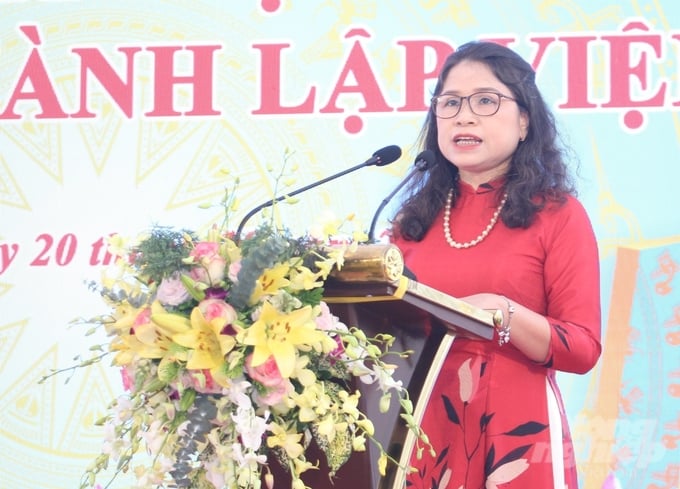
Associate. Prof. Dr. Dang Thi Lua, Director of the RIA I, shared about the achievements that the institute has achieved in 60 years of construction and development. Photo: Trung Quan.
In the coldwater fish farming sector, the institute was a pioneering entity in introducing coldwater fish species to Vietnam, contributing to the development of coldwater aquaculture, and providing livelihoods for thousands of people, particularly those in the northern mountainous regions and the Central Highlands. Furthermore, the institute successfully established a closed-loop industrial-scale yellowfin croaker farming model using a 200-ton HDPE cage system.
In addition to providing consultancy and technology transfer to domestic aquaculture facilities, localities, and businesses, the institute is extending its reach to international and regional collaborations. It has engaged in cooperative activities with over 50 international organizations, including prominent ones like FAO, NACA, UNDP, NORAD, DANIDA, ACIAR, and various embassies and organizations from countries such as Finland, South Korea, the Czech Republic, Hungary, and Cuba.
According to Assoc. Prof. Dr. Dang Thi Lua, these significant contributions have earned the institute recognition and prestigious awards from the Party, the State, the Government, and the Ministry of Agriculture and Rural Development. These awards include the title of Labor Hero Unit, Independence Medal 3rd Class, Labor Medal 3rd Class, 2nd Class, 1st Class, Ho Chi Minh Award, Vietnam Environment Award, and Commendations from the Prime Minister and the Minister of Agriculture and Rural Development.
Deputy Minister of Agriculture and Rural Development Phung Duc Tien shared that during the institute's 60 years of development, the Institute for Research on Aquaculture I has made highly important contributions to the advancement of aquaculture and agriculture as a whole. It is a place where various successful fish breeds, technological processes, nutritional feeding formulas, advanced farming methods, and environmental monitoring systems have been researched and developed.
In a context where there are still many limitations in terms of investment, the results of these research activities, when applied to practical production, have truly become a driving force for the development of the aquaculture sector. Moreover, the institute's proactive approach in expanding international cooperation has allowed it to access new technologies, innovative management practices, and new markets.
Based on that, the Deputy Minister stressed that in the upcoming period, the world is expected to continue facing unpredictable developments, with both the domestic and global economies forecasted to encounter many difficulties and challenges. Therefore, the agriculture sector must undergo significant transformation to truly become a pillar and support for the economy.
Furthermore, the Fourth Industrial Revolution and digital transformation are progressing rapidly. If research institutes remain stagnant with non-innovative topics, they will always lag behind other countries in the world. Additionally, the issue of low-quality aquatic seed production and trade continues to exist, and the need to import shrimp and fish seeds persists.
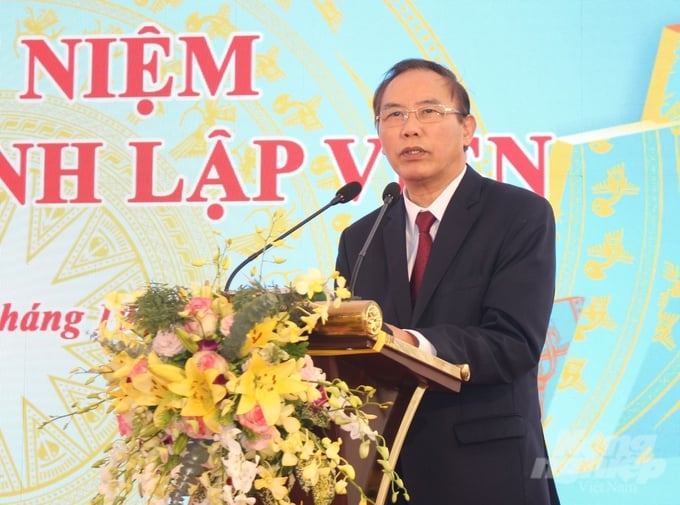
Deputy Minister Phung Duc Tien assessed that RIA I has made very important contributions to the development of the fisheries sector in particular and the agriculture sector in general. Photo: Trung Quan.
Hence, the RIA 1 must focus on advancing aquatic seed research, gradually paving the way for the establishment of the seed industry. Concurrently, it should develop in-depth research in nutritional feeding formulas, environmental monitoring, and disease prevention for aquaculture. Investment in modern infrastructure and equipment with sufficient capacity to meet the industry's demands in the new situation is essential.
At the same time, it fosters unity and coherence within the organization, emphasizing the training of high-quality human resources, and establishing close-knit linkages between scientific research, businesses, and producers following the spirit of "The state provides the stage, science leads, businesses compete, and farmers take the benefit."
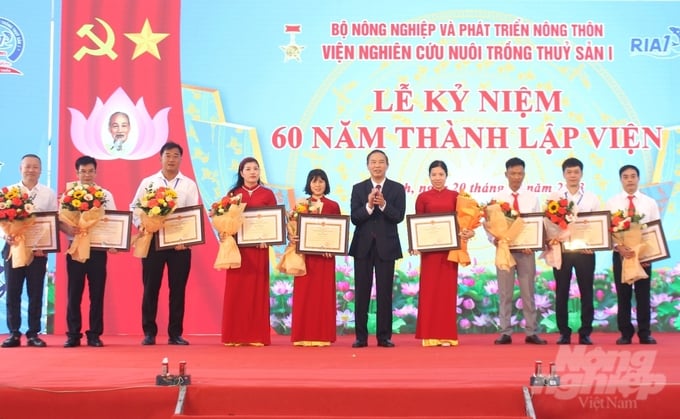
Deputy Minister Phung Duc Tien awarded the Certificate of Merit from the MARD to 2 groups and 7 individuals of the Research Institute for Aquaculture I who have successfully completed their work tasks in 2021-2022. Photo: Trung Quan.
During the ceremony, Mr. Nguyen Song Thao, Deputy Head of the Organizational Affairs Department (Ministry of Agriculture and Rural Development), announced the Government's Commendation Flag for the RIA I and the Minister of Agriculture and Rural Development's Commendation Certificate for 2 collectives and 7 individuals from the Institute for their excellent achievements in completing their tasks for the period 2021-2022.
Translated by Linh Linh
/2025/05/26/3422-3-102748_432.jpg)
(VAN) Prime Minister Pham Minh Chinh has been honored as the Distinguished ASEAN Leader at the ASEAN Leadership and Partnership Forum (ALPF) 2025 held in Malaysia, affirming Vietnam’s role and reputation.
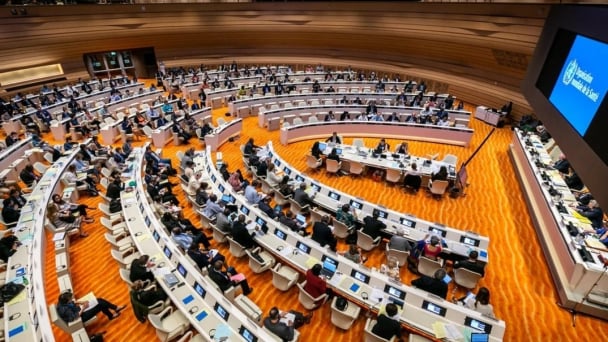
(VAN) At WHA78, with health placed at the heart of the global climate storm, Viet Nam enters a new commitment to protect communities from increasingly severe risks.
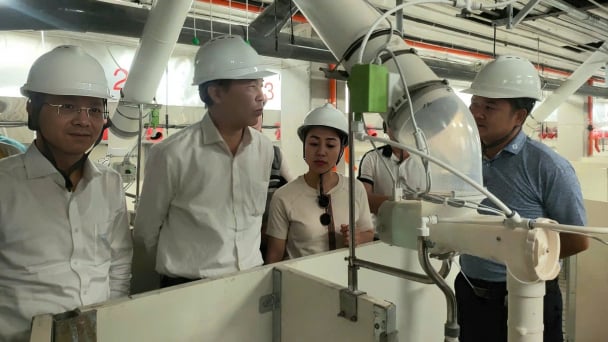
(VAN) Despite investment costs being 1.5 to 1.8 times higher than conventional methods, multi-story pig farming demonstrates outstanding effectiveness, increasing land-use efficiency by 4 to 10 times.
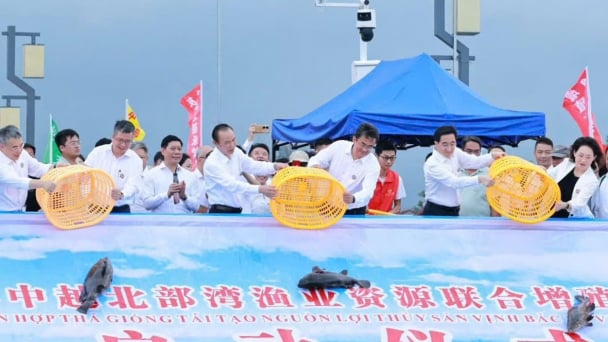
(VAN) Deputy Minister of Agriculture and Environment Phung Duc Tien leads a working delegation to participate in several key activities in China aimed at promoting agricultural and fisheries cooperation.
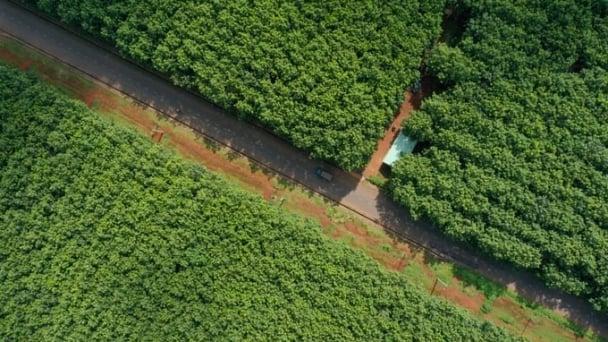
(VAN) The European Commission has just released a list of ‘low-risk’ countries for deforestation, which includes Vietnam.
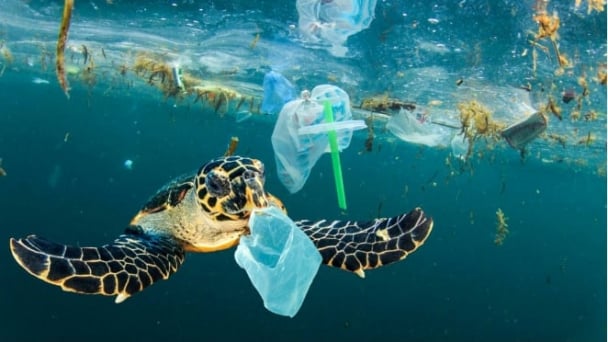
(VAN) The convenience of single-use plastics is leaving lasting consequences for the oceans.
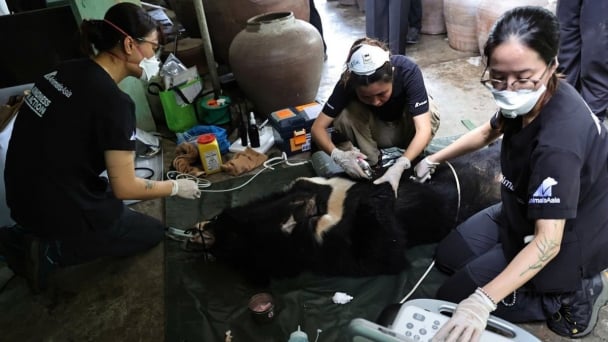
(VAN) On the morning of May 23, in Nghe An, the Animals Asia Foundation successfully rescued a Tibetan bear and transferred it to the Vietnam Bear Rescue Centre located in Bach Ma National Park.